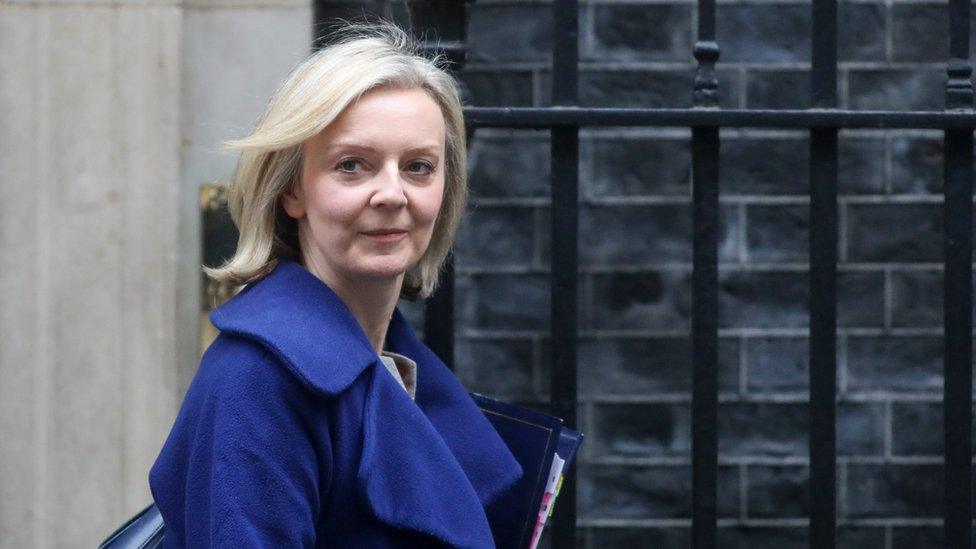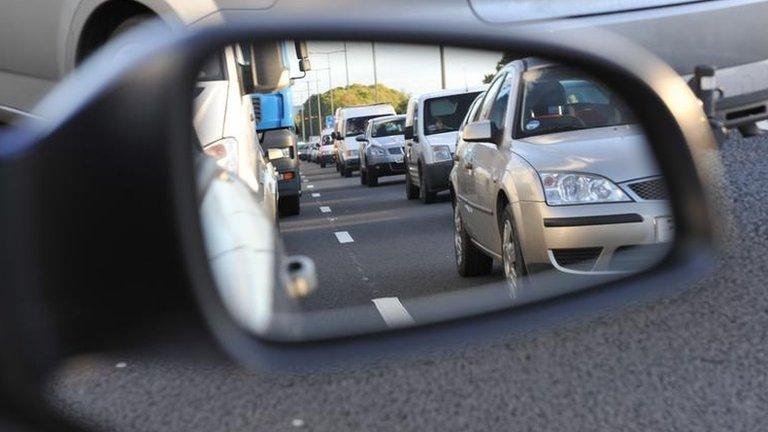Whiplash plans to 'cut car insurance premiums by £40'
- Published
This crash in London in 2010 was captured by a dashboard camera
Millions of motorists could see their car insurance premiums reduced as a result of plans to cut compensation for whiplash injuries in England and Wales.
Whiplash claims have risen by 50% over the past decade, costing insurance companies about £1bn a year.
The government said insurers have pledged to pass on the savings, worth about £40 a year.
Following a promise made last year, ministers are looking at scrapping the right to compensation or capping it.
In its consultation, the Ministry of Justice suggests that such payments - which are separate from medical bills or loss of earnings - could be banned.
Another option is capping them at a maximum of £425. By contrast the current average payout is £1,850.
'Better deals'
The government pointed out that while the number of road accidents in the UK has been falling, the number of whiplash claims has been increasing.
"For too long some have exploited a rampant compensation culture and seen whiplash claims an easy payday, driving up costs for millions of law-abiding motorists," said Justice Secretary Liz Truss.
"These reforms will crack down on minor, exaggerated and fraudulent claims."
Andrea Morrish outlines to Radio 4's Today the new government plans to crack down on whiplash claims.
Other proposed measures include:
Introducing a tariff system for compensation, payable for more significant injuries than whiplash
Allowing small claims courts to handle all personal injury claims up to £5,000, rather than just £1,000, so reducing legal costs
Requiring medical reports from an accredited expert before any claims can be paid
The Association of British Insurers (ABI) welcomed the consultation, saying the proposals would "give honest motorists a better deal".
'Fundamentally wrong'
The insurance industry has been complaining about the issue of whiplash claims for at least eight years.
Andrew Morris, operations director at UK insurance company Aviva, said that while the number of accidents on UK roads had fallen by almost 40% since 2000, the number of injury claims had risen by 90% over the same period.
"All of that suggests that actually there is something fundamentally wrong with our compensation system," he told the BBC. "In the UK, almost 80% of every injury claim that we see relates to whiplash. Now in France, by comparison, is it just 3%."
In 2015 alone, motor fraud accounted for 60% of all claims fraud detected by Aviva, Mr Morris said.
Aviva said the measures might also help to discourage nuisance calls and texts from claims management companies.


Case study: Lisa Eallett
Lisa Eallett, 46, from Totton in Southampton, describes her experience as "horrendous" and does not believe the government's proposals will work in genuine cases of motor injury.
Mrs Eallett, whose car was rear-ended by a Land Rover in February 2014, said: "My GP sent me for physio which helped. But I was sent for assessment by the other driver's insurance to no fewer than three specialists.
"I was made to feel a fraud and it was an upsetting experience."
Mrs Eallett said: "I will suffer from tinnitus and the hearing loss now for the rest of my life and no amount of money can compensate for that."
"At the time I was a working single mother and the whole experience was horrendous."

Case study: Philip Ainsworth
Following a minor accident almost three years ago, Phil Ainsworth, 51, from St Albans, is still receiving nuisance calls encouraging him to make a claim.
Mr Ainsworth said he and the driver exchanged details before he phoned his insurer. "There was no damage and that seemed to be the end of it."
But he said: "Then the calls started to come and I've been getting them ever since."
Mr Ainsworth said he has received in excess of 50 phone calls and text messages from various claim management companies using "different tactics" to entice him into making a whiplash claim.
"They say money's waiting for you or that they're just trying to clear the file and that you don't have to be injured or see a doctor. It's all very persuasive language they use."
He said: "I have held firm and not claimed, but sometimes wish I had claimed if only to stop all the calls."

'Broken system'
The government has tried to crack down on fraudulent injury claims before.
Under the Legal Aid, Sentencing and Punishment of Offenders Act 2012, external, so-called "no win, no fee" legal actions were curtailed, and referral fees were banned.
Following that law, whiplash claims fell by 19%, but it remains to be seen how effective any further measures might be.

Liz Truss said some had exploited a "rampant compensation culture"
Amanda Blanc, the chief executive of insurer AXA UK, also called for the government to push ahead with the reforms.
"We have been here before and still not yet managed to beat the whiplash epidemic," she said.
"This is a golden opportunity for the government to tackle the compensation culture once and for all."
The RAC motoring group's insurance director, Mark Godfrey, said the plan was "broadly welcome", but added: "It is crucial that motorists that have genuine claims are not disadvantaged, which is why we now look forward to seeing the finer detail of the government's proposals."
Any changes will require an act of Parliament, so are likely to be many months away.
- Published27 October 2016
